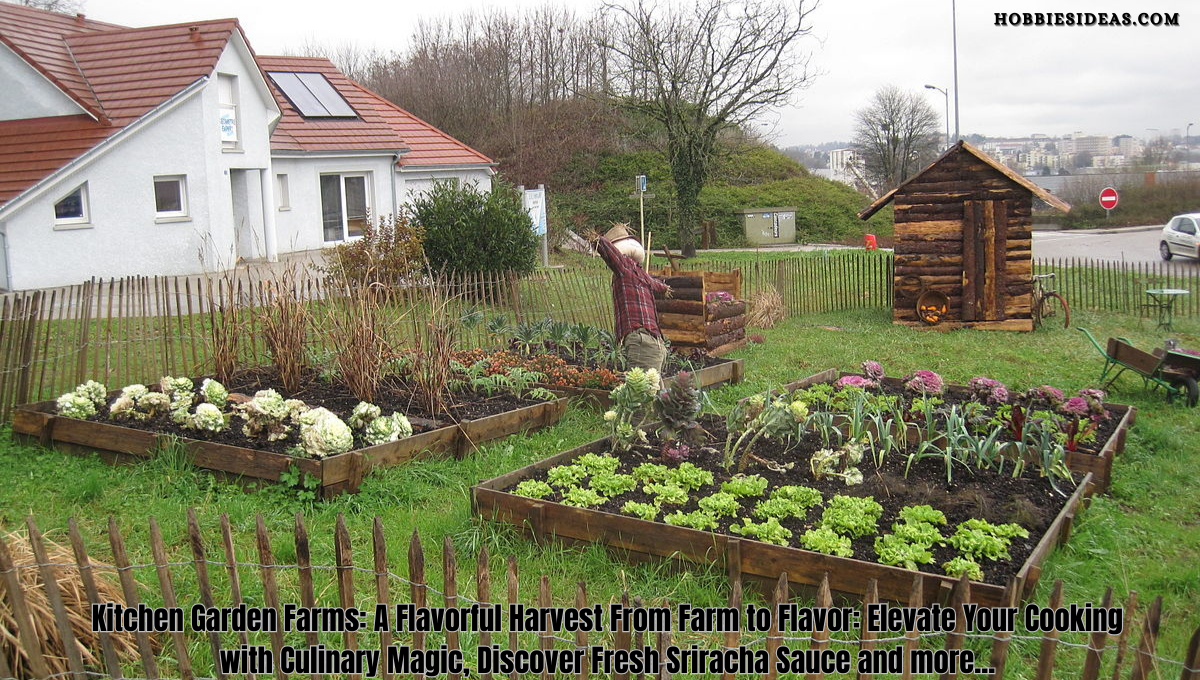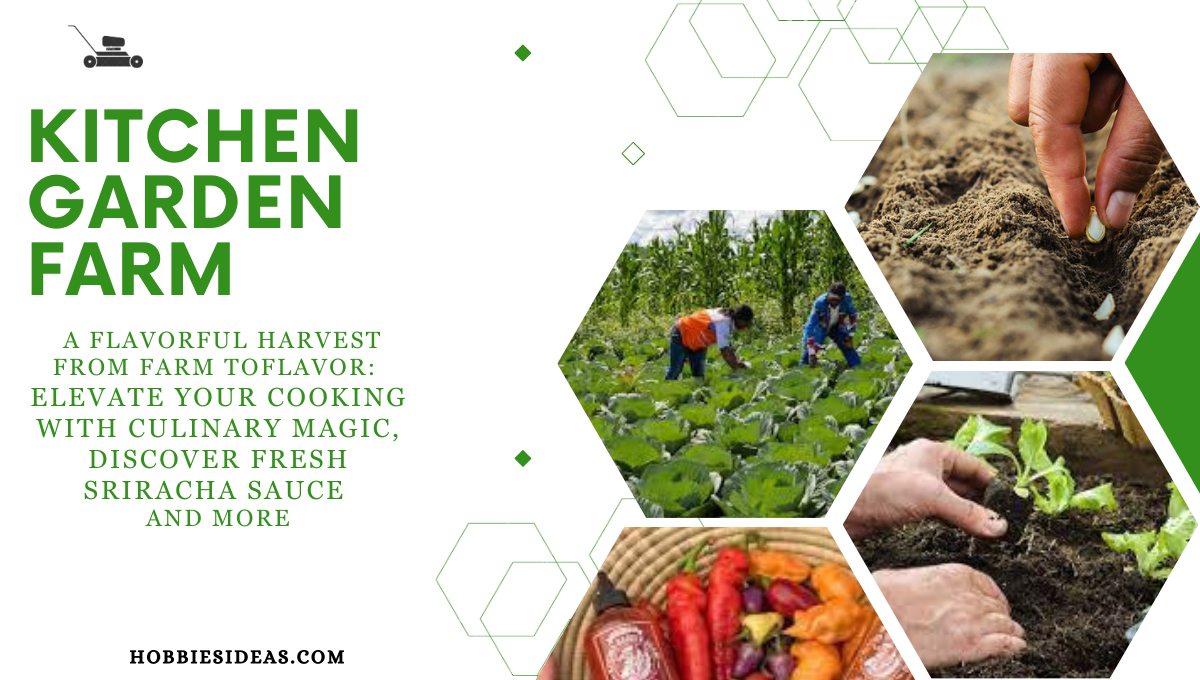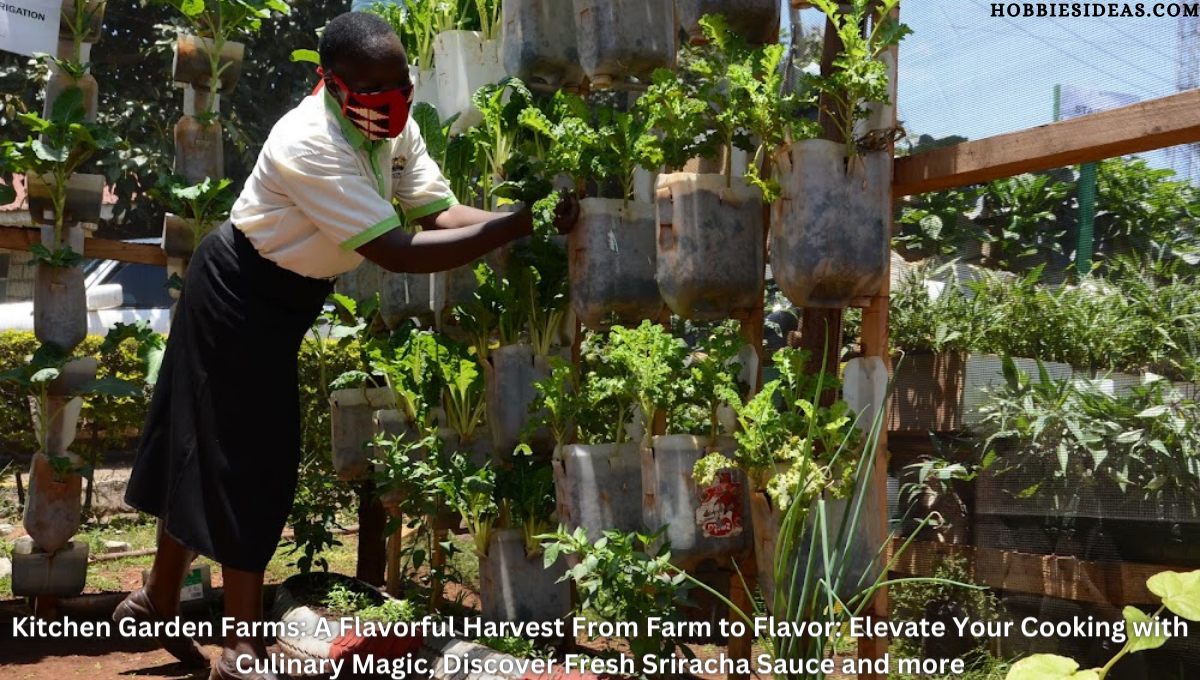Looking for fresh, organic produce that bursts with flavor? Look no further than Kitchen Garden Farms. This sustainable farm, nestled in [location], has been a staple in our community for over [number] years.
As a family-owned and operated establishment, Kitchen Garden Farms takes pride in delivering top-notch quality. Their commitment to providing the best fruits and vegetables is unmatched. From juicy tomatoes to crisp lettuce, their wide variety of offerings will satisfy even the most discerning taste buds.
Kitchen Garden Farms stands out as an epitome of excellence. With a focus on sustainability and organic practices, they have mastered the art of cultivating delicious crops while preserving the environment.
So why settle for anything less? Experience the freshness and goodness that only a farm like Kitchen Garden Farms can provide. Get ready to savor nature’s bounty right at your table.
Start exploring their delectable produce today!
Benefits of Starting a Kitchen Garden Farm
Starting a kitchen garden farm has numerous benefits that go beyond just having access to fresh, organic produce. Let’s explore the advantages of embarking on this rewarding journey.
Access to Fresh, Organic Produce
One of the primary benefits of starting a kitchen garden farm is the ability to have an abundant supply of fresh, organic produce right at your doorstep. Imagine plucking juicy tomatoes or crisp lettuce leaves directly from your garden and using them in your meals. The taste and nutritional value of homegrown fruits and vegetables are unparalleled compared to store-bought alternatives.
Not only does having a kitchen garden farm provide you with instant access to nutritious food, but it also allows you to control how it is grown. You have complete authority over the use of pesticides and fertilizers, ensuring that your produce is free from harmful chemicals. This empowers you to make healthier choices for yourself and your family.
Reduced Carbon Footprint and Sustainability
By growing your own food, you actively contribute to reducing your carbon footprint. Commercial agriculture often involves long-distance transportation, refrigeration, and packaging processes that emit greenhouse gases into the atmosphere. In contrast, cultivating a kitchen garden farm eliminates or significantly reduces these carbon-intensive activities.
Practicing sustainable gardening techniques such as composting organic waste and conserving water helps minimize environmental impact further. By adopting these eco-friendly practices, you are not only nurturing your plants but also promoting a more sustainable lifestyle for future generations.
Connection with Nature and Gardening Skills
A kitchen garden farm offers an excellent opportunity for individuals or families to connect with nature on a deeper level. Engaging in gardening activities provides a sense of tranquility as you immerse yourself in the beauty of nature’s cycles. Tending to plants can be therapeutic, relieving stress and anxiety while fostering mindfulness.

Moreover, starting a kitchen garden farm allows you to develop valuable gardening skills along the way. From learning about different plant varieties to understanding proper watering techniques and pest control methods, you gradually become a proficient gardener. This knowledge not only enhances your self-sufficiency but also opens doors to new hobbies or even potential entrepreneurial endeavors.
Tips for Starting and Maintaining a Successful Kitchen Garden Farm
Choose the Right Location
Finding the perfect location is crucial for the success of your kitchen garden farm. Look for an area that receives ample sunlight throughout the day, as most vegetables and herbs thrive in direct sunlight. Ensure that the soil has good drainage to prevent waterlogging, which can harm plant roots. A well-drained soil allows excess water to flow away, preventing root rot and other moisture-related issues.
Plan Your Garden Layout Carefully
To maximize productivity and maintain healthy plants, careful planning of your garden layout is essential. Consider implementing crop rotation techniques by dividing your garden into different sections or beds. This practice helps prevent nutrient depletion and minimizes pest infestations by disrupting their life cycles. Rotate crops annually, ensuring you don’t grow plants from the same family in the same area two years in a row.
Companion planting is another technique worth considering when designing your kitchen garden farm. Certain plants have mutually beneficial relationships when grown together. For example, planting marigolds near tomatoes can deter pests like nematodes while attracting beneficial insects such as ladybugs.
Regularly Monitor Soil Moisture Levels
Maintaining optimal soil moisture levels is vital for healthy plant growth. Periodically check the moisture content of your soil by inserting your finger into it up to the second knuckle. If it feels dry at this depth, it’s time to water your plants.
In addition to watering, providing proper nutrition is crucial for robust plant development. Composting organic matter or using organic fertilizers enriches the soil with essential nutrients required by your crops. Consider creating a compost pile using kitchen scraps, yard waste, and other organic materials to produce nutrient-rich compost for your garden.
Protect Plants from Pests Using Natural Methods
Pests can wreak havoc on your kitchen garden farm if left uncontrolled; however, resorting to chemical pesticides should be a last resort. Instead, opt for natural methods to protect your plants from unwanted critters.
Introduce beneficial insects like ladybugs and lacewings that feed on pests such as aphids and caterpillars. Erecting physical barriers like netting or fences can deter larger animals from damaging your crops.
You can also make organic pest repellents using ingredients readily available at home. For example, a mixture of water, soap, and chili powder can help control common garden pests when sprayed on the affected plants.
By following these tips for starting and maintaining a successful kitchen garden farm, you’ll be well on your way to enjoying an abundance of fresh produce right at your doorstep. Remember to adapt these suggestions based on your specific climate, plant selection, and gardening preferences to achieve the best results. Happy gardening!
Kitchen Garden Farms: Location and History
Kitchen Garden Farms is situated in a picturesque location that boasts favorable climate conditions for year-round farming. Nestled in the heart of [location], this farm enjoys abundant sunshine, moderate temperatures, and fertile soil, making it an ideal setting for cultivating a wide variety of crops.

Founded in [year], Kitchen Garden Farms has come a long way from its humble beginnings. What started as a small-scale operation has blossomed into a thriving agricultural enterprise that serves both local communities and markets further afield. The dedication and hard work of the farmers have been instrumental in transforming this once modest venture into one of the region’s most successful farms.
The rich agricultural history of the surrounding area has played a significant role in shaping Kitchen Garden Farms. Drawing inspiration from generations past, the farm embraces traditional farming practices while incorporating modern techniques to optimize productivity and sustainability. This fusion allows them to grow an impressive array of crops that reflect the diversity seen throughout the region’s agricultural heritage.
At Kitchen Garden Farms, you’ll find an abundance of crops suited to the local climate and culinary preferences. From vibrant heirloom tomatoes bursting with flavor to crisp salad greens that add freshness to any dish, their offerings are truly bountiful. The farm also cultivates an assortment of herbs like basil, cilantro, and mint that infuse dishes with aromatic goodness.
In addition to staple crops, Kitchen Garden Farms takes pride in experimenting with unique varieties that showcase their creativity and commitment to innovation. Imagine biting into juicy watermelon radishes or savoring the delicate sweetness of purple carrots—these unconventional yet delicious options are just some examples of what you might find at this extraordinary farm.
The dedication to sustainable agriculture is evident at every turn on Kitchen Garden Farms. By implementing organic growing practices and minimizing chemical inputs, they prioritize environmental stewardship while ensuring their produce is free from harmful substances. Visitors can witness firsthand how cover cropping techniques help enrich the soil, promoting long-term fertility and reducing erosion.
Kitchen Garden Farms is not just a place to grow food; it’s a community hub that fosters connections between farmers, consumers, and nature. They actively engage with customers through farm tours, workshops, and community events. This interaction allows people to gain a deeper understanding of where their food comes from and the effort behind its production.
Exploring the Product Range at Kitchen Garden Farm
At Kitchen Garden Farms, you’ll find an extensive selection of seasonal produce that will tantalize your taste buds. From heirloom tomatoes bursting with flavor to vibrant peppers that add a kick to any dish, their range of fresh and delicious options is sure to impress even the most discerning food enthusiasts.
In addition to a wide variety of fruits and vegetables, Kitchen Garden Farms also cultivates an array of herbs, flowers, and specialty crops like garlic or ginger. This diverse selection allows customers to explore new flavors and experiment with unique ingredients in their culinary creations.
One of the standout features of Kitchen Garden Farms is their commitment to offering lesser-known varieties that are not commonly found elsewhere. By doing so, they provide customers with a chance to discover and savor flavors they may have never experienced before. Whether it’s trying out an exotic tomato variety or experimenting with a rare herb, there’s always something exciting waiting for adventurous food lovers at Kitchen Garden Farms.
The farm takes great pride in the quality of their produce. Every item is carefully grown and harvested using sustainable farming practices. This dedication ensures that each fruit, vegetable, herb, or flower reaches its full potential in terms of both taste and nutritional value.
When you visit Kitchen Garden Farms, you can expect a delightful shopping experience where you can browse through rows upon rows of fresh produce. The farm’s knowledgeable staff is always ready to assist you in finding exactly what you need or offer recommendations based on your preferences.
To give you an idea of the incredible range available at Kitchen Garden Farms, here are just a few examples:
- Tomatoes: Indulge in juicy heirloom tomatoes like Brandywine or Cherokee Purple for salads or sandwiches.
- Peppers: Spice up your dishes with vibrant varieties such as habanero or jalapeno peppers.
- Herbs: Enhance your cooking with aromatic herbs like basil, cilantro, or rosemary.
- Garlic: Discover the intense flavors of different garlic varieties like Music or German White.
- Ginger: Add a zing to your recipes with fresh ginger, perfect for both savory and sweet dishes.
Located in Sunderland, Kitchen Garden Farms is a local gem that offers not only an incredible selection of produce but also a chance to support sustainable farming practices. So, next time you’re in the mood for fresh and flavorful ingredients, make sure to pay them a visit and explore their enticing product range.
The Making of Kitchen Garden Farm Sriracha Sauce
At Kitchen Garden Farms, they take pride in creating their signature Sriracha sauce using their very own homegrown chili peppers. This small team of dedicated farmers understands the importance of quality ingredients and the impact they have on the final product.
To start the process, the peppers are carefully harvested at peak ripeness. Each pepper is hand-picked to ensure only the best ones make it into the sauce. This attention to detail guarantees that every bottle of Kitchen Garden Farm Sriracha is bursting with flavor.
Once harvested, the chili peppers go through a meticulous fermentation process. Fermentation not only enhances the taste but also adds complexity to the flavor profile. The team at Kitchen Garden Farms understands that patience is key during this stage as it allows for natural transformation and development of flavors.

After fermentation, it’s time to blend the peppers with other carefully selected ingredients. The goal is to create a perfectly balanced Sriracha sauce that tantalizes taste buds without overwhelming them with heat. The team experiments with different combinations until they achieve just the right balance of flavors.
What sets Kitchen Garden Farm Sriracha sauce apart from others is its exceptional taste. Spice enthusiasts rave about its unique flavor profile that strikes a harmonious chord between heat and tanginess. Whether drizzled over tacos, added to stir-fries, or used as a dipping sauce, this Sriracha sauce elevates any dish it touches.
The farm’s commitment to using their own homegrown chili peppers ensures that every bottle of Sriracha carries their distinct touch. By controlling every step of production, from seed to bottle, they guarantee a superior product that stands out in both flavor and quality.
Word has spread about this remarkable Sriracha sauce crafted at Kitchen Garden Farms. It has gained recognition among food lovers and chefs alike who appreciate its artisanal nature and exceptional taste. People seek out this special condiment to add a kick of flavor to their meals.
Sustainable Practices at Kitchen Garden Farm
At Kitchen Garden Farm, sustainability is at the heart of everything they do. From crop rotation to water conservation techniques, this farm is committed to implementing environmentally friendly practices that ensure the longevity of their operations.
Crop Rotation and Cover Cropping
One of the key sustainable farming practices employed by Kitchen Garden Farm is crop rotation. This involves alternating the crops grown in specific areas from season to season. By doing so, they prevent the buildup of pests and diseases that can harm plants over time. Different crops have varying nutrient requirements, and rotating them helps maintain soil fertility naturally.
To further enhance soil health and reduce erosion, cover cropping is another technique utilized by the farm. Cover crops are planted between main crops to protect the soil from harsh weather conditions and minimize weed growth. These cover crops also act as natural fertilizers when they decompose, enriching the soil with essential nutrients.
Prioritizing Soil Health
Kitchen Garden Farm understands that healthy soil is crucial for productive farming. They prioritize soil health through various sustainable practices such as using organic fertilizers and composting. Organic fertilizers provide essential nutrients without harming beneficial organisms in the soil or causing long-term damage to ecosystems.
Composting plays a vital role in maintaining a healthy balance of organic matter in the soil. By recycling plant waste and other organic materials, Kitchen Garden Farm creates nutrient-rich compost that improves soil structure, retains moisture, and promotes beneficial microbial activity.
The minimal use of synthetic pesticides or herbicides is another aspect of their commitment to preserving soil health. Instead, they employ integrated pest management techniques that focus on preventing pest problems through cultural practices like crop rotation and physical barriers rather than relying solely on chemical solutions.
Utilizing Renewable Energy Sources
Reducing their carbon footprint is a top priority for Kitchen Garden Farm. To achieve this goal, they harness renewable energy sources such as solar power to meet their energy needs. Solar panels installed on the farm’s buildings generate clean electricity, reducing dependence on fossil fuels and minimizing greenhouse gas emissions.
By utilizing solar power, Kitchen Garden Farm not only reduces their environmental impact but also contributes to the development of a sustainable energy future. This commitment to renewable energy aligns with their overall mission of practicing responsible farming that benefits both people and the planet.
Community Involvement and Education Programs at Kitchen Garden Farm
At Kitchen Garden Farm, community involvement is at the heart of everything we do. We believe that fostering a strong connection between people and their food is essential for creating a sustainable and healthy future. Through our farmer’s markets, CSA programs, and farm-to-table events, we actively engage with the local community, providing them with access to fresh produce while supporting local farmers.
One of the ways we promote community involvement is through our farmer’s markets. These vibrant gatherings bring together farmers, artisans, and consumers in a lively atmosphere where they can connect directly with the source of their food. By participating in these markets, we not only provide our community with high-quality produce but also create opportunities for people to learn about sustainable farming practices and discover new ways to incorporate fresh ingredients into their meals.

In addition to farmer’s markets, our CSA (Community Supported Agriculture) programs offer another avenue for community engagement. By becoming a member of our CSA program, individuals receive regular deliveries of seasonal produce directly from our farm. This model not only ensures that members have access to fresh and nutritious food but also creates a sense of shared responsibility within the community as they support local agriculture.
Education plays a vital role in empowering individuals to make informed choices about their food and lifestyle. At Kitchen Garden Farm, we recognize this importance and offer various educational workshops throughout the year. These workshops cover topics such as gardening techniques, sustainable farming methods, and cooking with fresh produce.
Our gardening workshops provide participants with practical knowledge on how to start their own kitchen gardens or improve existing ones. From selecting suitable plants to understanding soil health and pest management strategies, attendees gain valuable insights into successful gardening practices.
Sustainable farming methods are crucial for preserving our environment while ensuring long-term food security. Our workshops on this topic educate participants about organic farming techniques, composting methods, water conservation strategies, and biodiversity preservation. By sharing these sustainable practices, we aim to inspire individuals to make environmentally conscious choices in their own lives.
Cooking with fresh produce is an art that can transform simple ingredients into delicious meals. Our cooking workshops focus on showcasing the flavors and versatility of seasonal produce. Participants learn how to prepare nutritious and flavorful dishes using farm-fresh ingredients, enhancing their culinary skills while promoting a healthy lifestyle.
Collaborations with schools and organizations further extend our reach into the community, providing opportunities for hands-on learning experiences for all ages. Through partnerships with local schools, we offer educational field trips where students can explore our farm, learn about different crops, and understand the importance of sustainable agriculture. We also collaborate with organizations to host farm-to-table events that highlight the connection between local farms and restaurants, fostering a deeper appreciation for locally sourced food.
Conclusion
In conclusion, Kitchen Garden Farms offers numerous benefits for those interested in starting their own kitchen garden farm. By providing a wide range of products and promoting sustainable practices, they have established themselves as a leader in the industry. Their commitment to community involvement and education programs further demonstrates their dedication to creating a positive impact.
Starting a kitchen garden farm can bring about various advantages, such as having access to fresh and organic produce right at your doorstep. It allows you to take control of what goes into your food and promotes a healthier lifestyle. Maintaining a successful kitchen garden farm requires careful planning, proper location selection, and consistent maintenance.
Kitchen Garden Farms has an impressive product range that caters to different tastes and preferences. From their renowned Sriracha sauce to other unique offerings, they provide customers with high-quality options that are sure to enhance any dish. The making of their Sriracha sauce exemplifies their commitment to using locally grown ingredients and traditional methods.
Sustainability is at the core of Kitchen Garden Farms’ operations. They prioritize eco-friendly practices such as composting, water conservation, and minimizing waste generation. By adopting these sustainable practices, they contribute positively towards environmental preservation.
Furthermore, Kitchen Garden Farms actively engages with the community through various involvement programs and educational initiatives. These efforts not only promote awareness about sustainable farming but also empower individuals with the knowledge needed for successful gardening endeavors.
To experience the benefits of starting your own kitchen garden farm or explore the diverse product range at Kitchen Garden Farms, visit their website or reach out to them directly. Embrace the opportunity to grow your own fresh produce while supporting local farmers and contributing towards a more sustainable future.
FAQs
Can I start a kitchen garden farm even if I don’t have much gardening experience?
Absolutely! Starting a kitchen garden farm doesn’t require extensive gardening experience. With some basic knowledge and guidance from resources like Kitchen Garden Farms’ educational programs or online tutorials, you can begin your journey towards a successful kitchen garden farm.
How do I choose the right location for my kitchen garden farm?
When selecting a location for your kitchen garden farm, consider factors such as sunlight exposure, soil quality, and access to water. Look for areas in your yard that receive ample sunlight throughout the day and ensure the soil is well-draining. Having easy access to a water source will make maintenance more convenient.
Are all the products at Kitchen Garden Farms organic?
Yes, Kitchen Garden Farms prides itself on offering organic products. They prioritize using locally grown ingredients that are free from synthetic pesticides and fertilizers. You can trust that their products are of the highest quality and meet organic standards.
Can I purchase Kitchen Garden Farms’ products online?
Yes, you can conveniently purchase Kitchen Garden Farms’ products through their website. They offer an online store where you can browse their product range and have them delivered straight to your doorstep.
How does Kitchen Garden Farms contribute to sustainability?
Kitchen Garden Farms implements sustainable practices throughout their operations. They compost organic waste, conserve water through efficient irrigation systems, and minimize waste generation by utilizing every part of the produce they grow. By prioritizing sustainability, they reduce their environmental impact and promote responsible farming practices.

